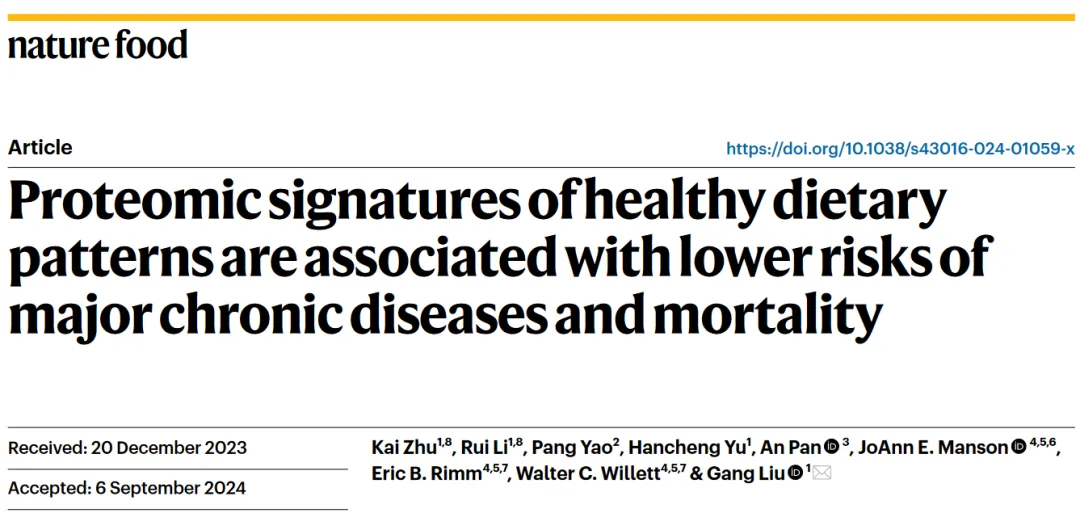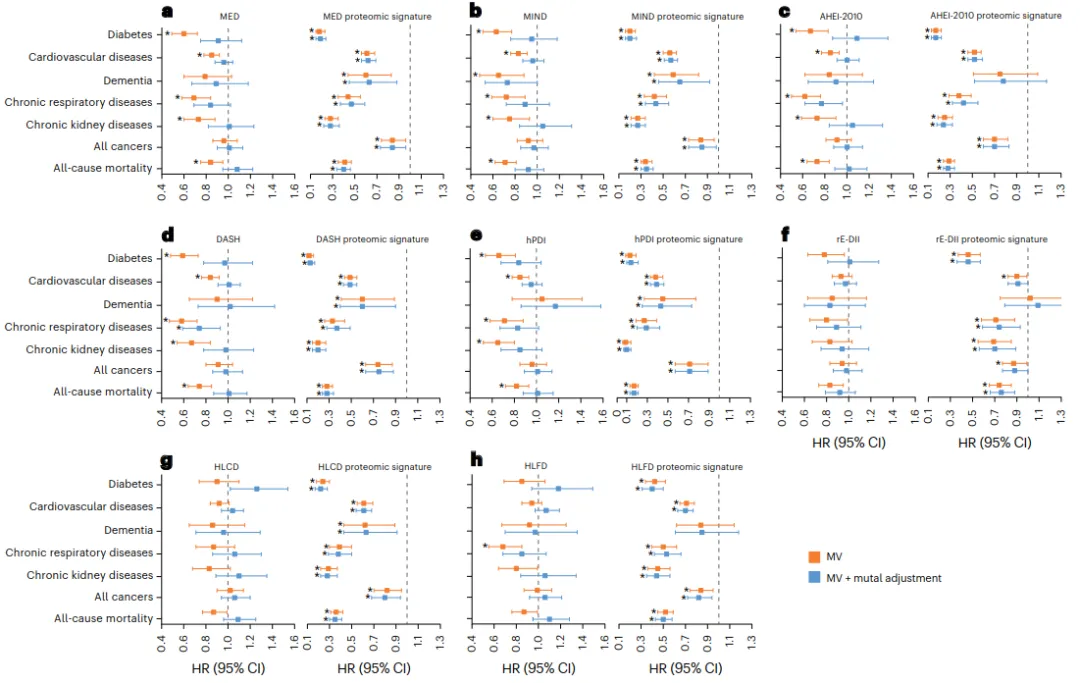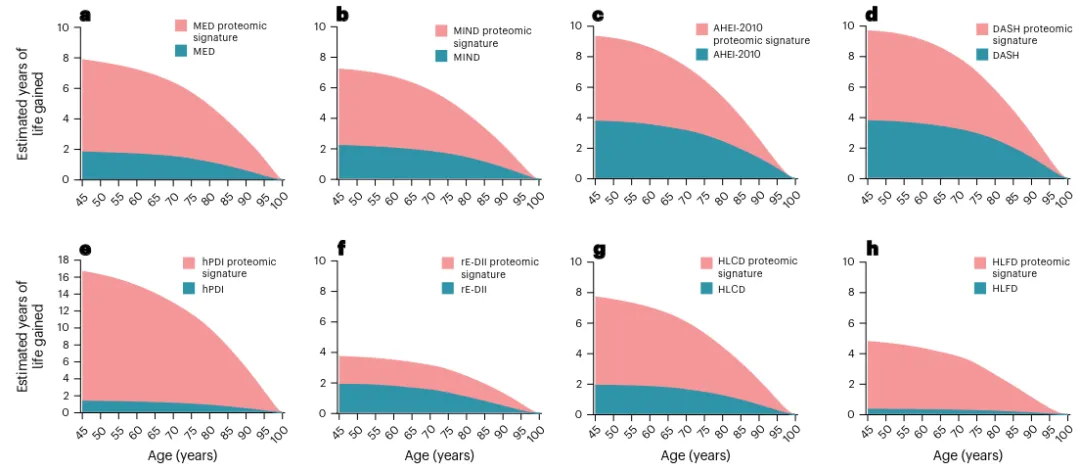Their study, titled "Proteomic signatures of healthy dietary patterns are associated with lower risks of major chronic diseases and mortality." appeared in a recent online issue of Nature Food, a Nature journal. The team found that the proteomic signature profiles of 8 healthy dietary patterns are significantly associated with the risk of chronic metabolic diseases such as diabetes and cardiovascular diseases, as well as mortality risk. Additionally, key proteins such as Follistatin-like protein 3 (FSTL3) act as an important mediator in the association between various dietary patterns and common chronic metabolic diseases. The research suggested that proteomics has significant potential in the precise assessment of dietary nutrition and provides new insights into the potential mechanisms by which dietary factors affect chronic metabolic diseases like diabetes and cardiovascular diseases.

Globally, unhealthy dietary factors cause 11 million deaths each year and result in a loss of 255 million disability-adjusted life years. Adhering to a healthy diet is an effective and cost-effective public health strategy for the prevention of chronic diseases. Dietary patterns can reflect the synergistic and cumulative effects of various foods and nutrients, rendering them an effective tool for examining the overall impact of comprehensive dietary factors on health risks. However, traditional dietary assessments are subject to recall bias and measurement errors. Studies have shown that biomarkers in the body have great potential in quantifying dietary intake and are expected to serve as an important supplement to traditional dietary assessments. However, it is unclear whether proteomics can work as an important supplement to dietary assessments. Whether the proteomic fingerprint profiles related to dietary patterns affect the risk of common chronic metabolic diseases such as diabetes and cardiovascular diseases is also unclear. Furthermore, the potential regulatory mechanisms by which healthy dietary patterns influence common chronic metabolic diseases have yet to be explored.
This study developed a scoring scale for 8 healthy dietary patterns, including the Mediterranean diet (MED), Alternative Healthy Eating Index-2010 (AHEI-2010), Dietary Approaches to Stop Hypertension (DASH), Mediterranean-DASH Intervention for Neurodegenerative Delay (MIND), Healthy Plant-based Diet Index (hPDI), anti-inflammatory diet (rE-DII), Healthy Low-Carb Diet (HLCD), and Healthy Low-Fat Diet (HLFD). The study recruited approximately 22,000 participants in whom both dietary data and proteomic data were available. After a median follow-up lasting for 10.4 to 11.9 years, 627 cases had diabetes, 3,215 had cardiovascular diseases, 309 had dementia, 640 had chronic respiratory diseases, 609 had chronic kidney diseases, 1,806 had cancer, and 1,585 died. The main findings of this study included:
Among the 2,915 protein markers analyzed, the number of proteins significantly associated with the 8 dietary patterns ranged from 595 to 1,177. Further KEGG enrichment analysis showed that proteins associated with each dietary pattern were mainly enriched in pathways related to lipid metabolism and atherosclerosis, immunity, inflammation, among others. In addition, 378 proteins were significantly associated with all 8 dietary patterns, and these proteins were mainly enriched in antiviral pathways involving interactions between viral proteins and cytokines and cytokine receptors, lysosomes, complements, and coagulation pathways.
This study identified the proteomic signature profiles corresponding to the 8 dietary patterns, which mirror the participants' adherence to each dietary pattern and the resulting proteomic changes in the body. After adjusting for various confounding factors, the analysis found that the proteomic signature profiles of the 8 dietary patterns were significantly associated with the risk of diabetes, cardiovascular diseases, chronic respiratory diseases, chronic renal diseases, cancer, and mortality, and this association remained significant after further adjustment for the corresponding dietary patterns.

In terms of life expectancy, adhering to the 8 healthy dietary patterns could extend average life expectancy by 0.35-3.80 years, while the average life expectancy increased by 3.74-16.72 years corresponding to the proteomic signature profiles of the dietary patterns.

Proteins such as FSTL3 play a potential mediating role in the link between various healthy dietary patterns and chronic metabolic diseases and mortality. The discovery of these proteins provides new insights into the potential mechanisms of dietary patterns impacting chronic metabolic diseases like diabetes.
In summary, this study, based on dietary and proteomic data, for the first time, clearly identified the proteomic signature profiles corresponding to 8 healthy dietary patterns and confirmed that these protein signature profiles are significantly associated with the occurrence and mortality risk of common chronic metabolic diseases. The study exhibited that proteomics represents a new perspective for the precise assessment of dietary nutrition and offers novel clues for understanding the potential mechanisms by which dietary factors influence chronic metabolic conditions such as diabetes and cardiovascular diseases.
